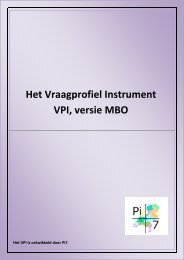De eenvoud en complexiteit van Opbrengstgericht Werken (PDF ...
De eenvoud en complexiteit van Opbrengstgericht Werken (PDF ...
De eenvoud en complexiteit van Opbrengstgericht Werken (PDF ...
Create successful ePaper yourself
Turn your PDF publications into a flip-book with our unique Google optimized e-Paper software.
feedback and marking against learning int<strong>en</strong>tions. London: Institute of<br />
Education, University of London.<br />
Clarke, S., & McCallum, B. (z.j.-b). Gillingham Partnership Formative Assessm<strong>en</strong>t<br />
Project 2000–2001: Final report on the third term of the project and final<br />
conclusions. Third term focus: Target setting. London: Institute of Education,<br />
University of London.<br />
Copland, M. (2002). Leadership of inquiry: Building and sustaining capacity for<br />
school improvem<strong>en</strong>t in the Bay Area School Reform Collaborative. Stanford,<br />
CA: C<strong>en</strong>ter for Research on the Context of Teaching, Stanford University.<br />
Cull<strong>en</strong>, J.B., & Reback, R. (2006). Tinkering toward accolades: school gaming under<br />
a performance accountability system. Cambridge: National Bureau of Economic<br />
Research. Working paper 12286. http://www.nber.org/papers/w12286.<br />
Diamond, J., & Cooper, K. (2007). The uses of testing data in urban elem<strong>en</strong>tary<br />
schools: Some lessons from Chicago. In P. Moss (Ed.), Evid<strong>en</strong>ce and decision<br />
making. 106th yearbook of the National Society for the Study of Education (pp.<br />
241–263). Mald<strong>en</strong>, Massachusetts: Blackwell Publishing.<br />
DiMaggio, P.J., & Powell, W.W. (1983). The Iron Cage Revisited: Institutional<br />
Isomorphism and Collective Rationality in Organizational Fields. American<br />
Sociological Review, 48(1), 147-160.<br />
Ehr<strong>en</strong>, M.C.M. (in voorbereiding). Responses of schools to accountability systems using<br />
multiple measures; School improvem<strong>en</strong>t and strategic behavior of elem<strong>en</strong>tary schools in<br />
New York.<br />
Figlio, D.N. and Getzler, L.S. (2002). Accountability, ability and disability: gaming<br />
the system. NBER working paper 9307. http://www.nber.org/papers/w9307.<br />
Fink, D., & Stoll, L. (1998). Educational Change: Easier Said Than Done. In<br />
Lieberman, A., Fullan, M., & Hopkins, D. (Eds.), International Handbook of<br />
Educational Change, Vol. 5 [pp. 297-321]. Dordrecht/Boston/London: Kluwer<br />
Academic Publishers.<br />
Fuchs, L.S., & Fuchs, (1986). Effects of systematic formative evaluation: A metaanalysis.<br />
Exceptional Childr<strong>en</strong>, 53(3), 199-208.<br />
Fuhrman, S.H. (2003). Redesigning Accountability Systems for Education. CPRE<br />
Policy Briefs RB-38.<br />
Geijsel, P., Sleegers, P.J.C., Stoel, R.D. and Kruger, M.L. (2009). The Effect of<br />
Teacher Psychological and School Organizational and Leadership Factors on<br />
Teachers’ Professional Learning in Dutch Schools. The Elem<strong>en</strong>tary School<br />
Journal, 109(4), 1-22.<br />
Goertz, M.E. and Duffy, M.C. (2001). Assessm<strong>en</strong>t and Accountability Across the 50<br />
States. Policy brief RB-33.<br />
http://www.cpre.org/images/stories/cpre_pdfs/rb33.pdf<br />
Goertz, M., Oláh, L., & Riggan, M. (2009, <strong>De</strong>cember). Can interim assessm<strong>en</strong>ts by<br />
used for instructional change? CPRE Policy Briefs RB-51. Philadelphia:<br />
Consortium for Policy Research in Education.<br />
Hall, B., & Hewitt-Gervais, C.M. (2000). The application of stud<strong>en</strong>t portfolios in<br />
primary/intermediate and self-contained/multi-age team classroom<br />
<strong>en</strong>vironm<strong>en</strong>ts: Implications for instruction, learning, and assessm<strong>en</strong>t. Applied<br />
Measurem<strong>en</strong>t in Education, 13(2), 209-228.<br />
Halverson, R., Grigg, J., Pritchett, R., & Thomas, C. (2005). The new instructional<br />
leadership: Creating data-driv<strong>en</strong> instructional systems in schools. WCER<br />
Working Paper No. 2005-10. Madison, WI: Wisconsin C<strong>en</strong>ter for Education<br />
Research (WCER).<br />
35





